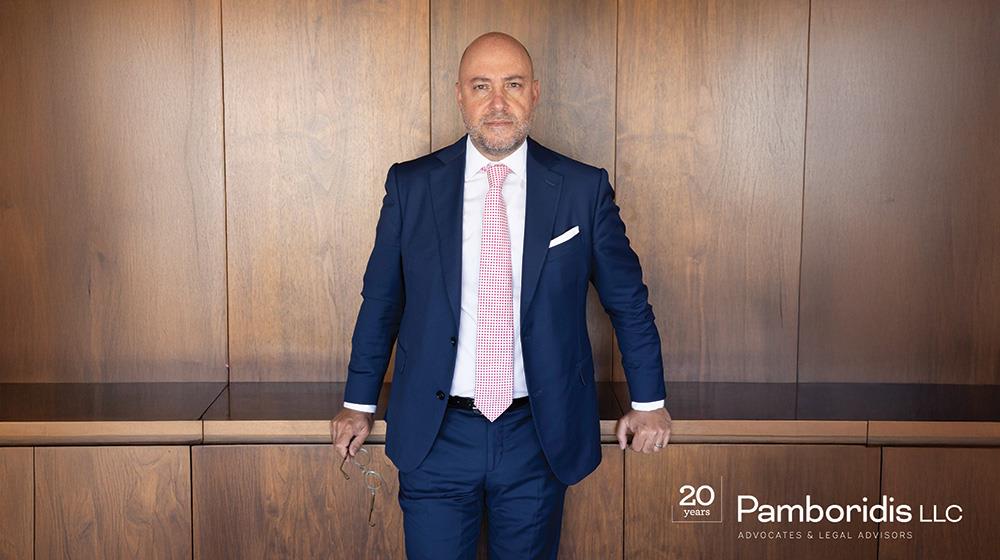"The most insistent challenge facing our legal system is not technological; it remains, to this day, institutional. Despite repeated efforts to modernise the judicial framework in recent years, the results have been disappointingly superficial. What Cyprus needs is structural reform, not procedural workarounds," Dr. George Pamboridis, Founder and Senior Partner, Pamboridis LLC: Advocates & Legal Advisors proposes.
In a recent interview with GOLD magazine, the expert also talks about evolving client expectations and technology's impact on the legal sector.
Pamboridis, in addition, shares his view on, among other things, how international geopolitical tensions, trade-related uncertainty and other problems are shaping the business and investment landscape in Cyprus
Evolving client expectations, disruptive technology and growing competition are forcing law firms to rethink the way they deliver legal services. How is your firm adapting to this new reality?
I would suggest that the core expectations of a conscientious client – flexibility, accuracy, responsiveness and cost-efficiency – have essentially remained stable. What has changed is the intensity with which these demands are now expressed and the market conditions within which they must be met. Technology has proven to be a powerful enabler in both contexts; however, I believe the real shift lies in the mindset.
Legal services today have become a matter of managing accruing complexity instead of supporting compliance with formalities and this purpose requires human adaptability more than digital infrastructure. For this very reason, our firm treats adaptation as a continuous mode of engagement with this new environment and not as a reaction to pressure. We aim to maintain a legal presence that is proactive, multidisciplinary and mindful of both the business landscape and the social context in which our clients operate. Technology supports this effort, of course, but our focus remains on the quality of thinking and the clarity of the value we provide.
How have client priorities evolved and, looking ahead, which areas do you expect to demonstrate the most rapid growth?
Client priorities are mainly shaped by time and complexity. The traditional model – clients seeking solutions with adaptive affordance in terms of time – is gradually declining in the global context. Today’s counsel is expected to work faster, anticipate more risks, understand more context and, most importantly, offer strategic clarity in environments naturally defined by uncertainty. We have seen increasing demand in areas that require broad sectoral awareness, such as regulatory compliance, data protection, ESG frameworks and cross-border dispute resolution.
Looking at the broader picture, I expect significant growth in technology and data-related fields, without anticipating that traditional fields will be overlooked, especially since they are being constantly reframed by the demands of international legal practice. In any case, I would say that the purest growth will likely come from a firm’s ability to provide stability and trust in a world of constant movement. This is the true kind of value that clients seek and, increasingly, this is what appears to be the measure by which legal partnerships are sustained.
The local legal profession is facing internal headwinds, from the stalled e-Justice system to the uncertainty surrounding the proposed Single Supervisory Authority. In your view, what are the most pressing challenges that need to be addressed?
The most insistent challenge facing our legal system is not technological; it remains, to this day, institutional. Despite repeated efforts to modernise the judicial framework in recent years, the results have been disappointingly superficial. What Cyprus needs is structural reform, not procedural workarounds. The stalled digitalisation of the courts is only a symptom; delays in proceedings, outdated infrastructure, a judicial mindset disengaged from the needs of modern society, and many other elements of institutional pathology still stand as obstacles to justice and our economic viability.
The lack of clarity surrounding the proposed Single Supervisory Authority is yet another expression of this problem. The mere controversy itself reveals a deeper concern: that in its current form, oversight is more likely to paralyse activity than to promote trust. That alone should compel us to shift from viewing compliance as a box-ticking exercise to finally treating it as a cornerstone of the country’s legal and economic credibility. This is our greatest challenge and it is one that we cannot overcome with regulatory tools and emergency patchwork. It demands trust, political courage, institutional cooperation and, above all, a culture that prioritises substance over form.
How are international geopolitical tensions, trade-related uncertainty and other problems shaping the business and investment landscape in Cyprus?
The economy of Cyprus has always operated under global exposure. The war in Ukraine and the resulting sanctions forced us to confront the risks of overdependence on a single geopolitical sphere; as a result, we now face two key realities: a shrinking market and an oversupply of legal services. Still, I believe that there is an opportunity to reposition Cyprus as a destination for long-term investment, but only if we first rebuild the kind of trust that such a vision requires. That means creating a system capable of inspiring the sense of security needed to entrust one’s long-term interests to the country. If we are truly serious about making this happen, we must begin by acknowledging the obvious: The greatest risk we face today has nothing to do with external volatility but with our own resistance to structural reform. It is time for us to stop justifying our reactions and start working on the actual prospects afforded by the current state of affairs.
Finally, which aspect of the legal industry do you expect to be most disrupted by technology over the next five years and how are you preparing for it?
The most important thing to understand about technology is how it essentially redefines what legal work actually means. If I had to venture a forecast for the next five years, I would expect the most significant disruption to come from automation – particularly in areas once considered fundamental to legal practice like document drafting, legal research and even the administration of justice itself. Artificial Intelligence is already performing many of these tasks faster and, in some cases, more accurately than a human lawyer with limited time. As alarming as that may sound, I do not view it as a threat. What I see is a valuable, even “expiatory” tool. If anything, technology will allow us to return to what law should have always been: a profession of strategy, judgment, interpretation and advocacy. Technological fluency will undeniably matter more – but human judgement will always matter most. The lawyer of the future will not be challenged by machines but by the complexity, contradiction and ever-changing dynamics that machines will induce; and this is the very landscape within which we, as a Firm, consistently position our thinking.
(Original photo by TASPHO)
*This interview first appeared in the August edition of GOLD magazine. Click here to view it.









